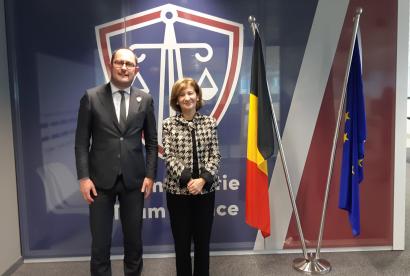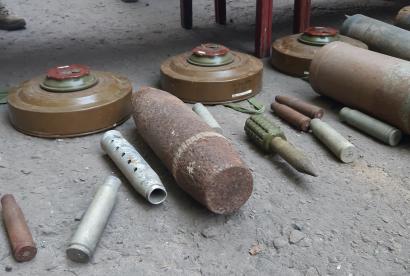Newsroom
News and press releases
News and press releases from the OSCE's global activities.
OSCE organizes workshops on youth crime and drug use prevention in Nur-Sultan
Publishing date: 12 April 2022
On 17 March, and 11 and 12 April, the Office of the Co-ordinator of OSCE Economic and Environmental Activities and the OSCE Transnational Threats Department together with the OSCE Academy in Bishkek, co-organized workshops on youth crime and drug use prevention in Nur-Sultan. The focus of the workshops was cross-agency co-operation through the exchange of best practices and lessons learned in this specific area.
OSCE Media Freedom Representative reiterates grave worries regarding safety of journalists in Ukraine
Publishing date: 6 April 2022
Content type: Press release
Where we are: OSCE Representative on Freedom of the Media
What we do: Media freedom and development, Safety of journalists
VIENNA, 6 April 2022 – The OSCE Representative on Freedom of the Media Teresa Ribeiro today reiterated her grave worries regarding the safety of journalists during the Russian ongoing military attack in Ukraine, as the death toll, injuries and harassment of media workers grows.
OSCE organizes second youth crime and drug use prevention workshop in Dushanbe
Publishing date: 5 April 2022
Content type: News
Where we are: Office of the Co-ordinator of OSCE Economic and Environmental Activities, Transnational Threats Department
What we do: Youth
On 4 and 5 April 2022, the OSCE Transnational Threats Department and the Office of the Co-ordinator of OSCE Economic and Environmental Activities, in co-operation with the OSCE Academy in Bishkek and the UN Office on Drugs and Crime (UNODC), jointly hosted a two-day workshop on youth crime and drug use prevention in Dushanbe.
OSCE Representative on Freedom of the Media concludes visit to Belgium
Publishing date: 5 April 2022
Content type: News
Where we are: OSCE Representative on Freedom of the Media
On 30 and 31 March 2022, OSCE Representative on Freedom of the Media (RFoM) Teresa Ribeiro visited Belgium.
Threats from explosive ordnance and mines are an expanding aspect of urgent humanitarian needs for Ukraine, says OSCE Project Co-ordinator in Ukraine
Publishing date: 4 April 2022
Content type: Press release
Where we are: OSCE Project Co-ordinator in Ukraine (closed)
What we do: Conflict prevention and resolution
KYIV/VIENNA, 4 April 2022 – International assistance to Ukraine is urgently needed to strengthen the country’s capacity in humanitarian demining and Explosive Ordnance Risk Education. This was the main message by Ambassador Henrik Villadsen, OSCE Project Co-ordinator in Ukraine, today as he marked the International Day for Mine Awareness and Assistance in Mine Action.
Serbia’s elections offered diverse political options, but shortcomings led to an uneven playing field, international observers say
Publishing date: 4 April 2022
Content type: Press release
Where we are: OSCE Office for Democratic Institutions and Human Rights
What we do: Elections
BELGRADE, 4 April 2022 – Fundamental freedoms were largely respected in Serbia’s 3 April presidential and early parliamentary elections, and voters were presented diverse political options, but a number of shortcomings resulted in an uneven playing field, favouring the incumbents, international observers said in a statement today. The combined impact of unbalanced access to the media, undue pressure on public sector employees to support the incumbents, significant campaign finance disparities and misuse of state resources resulted in unequal conditions for contestants, the statement says...
Hungary’s parliamentary elections well-run and offered distinct alternatives but undermined by absence of level playing field, international observers say
Publishing date: 4 April 2022
Content type: Press release
Where we are: OSCE Office for Democratic Institutions and Human Rights
What we do: Elections
BUDAPEST, 4 April 2022 – Hungary’s parliamentary elections offered voters distinct alternatives and were well run, but while competitive, the process was marred by the pervasive overlapping of government and ruling coalition’s messaging that blurred the line between state and party, as well as by media bias and opaque campaign funding, international observers said in a statement today.






